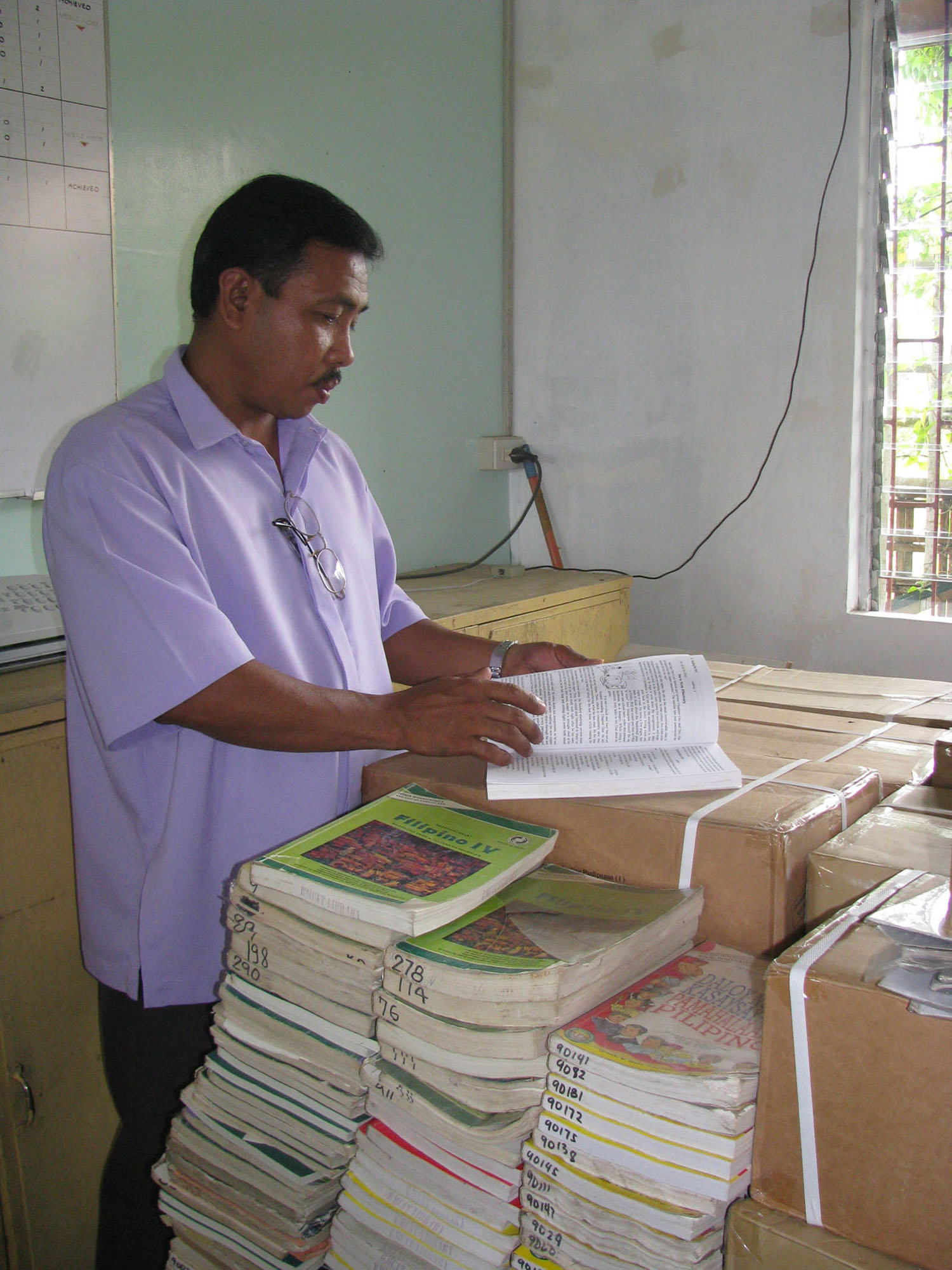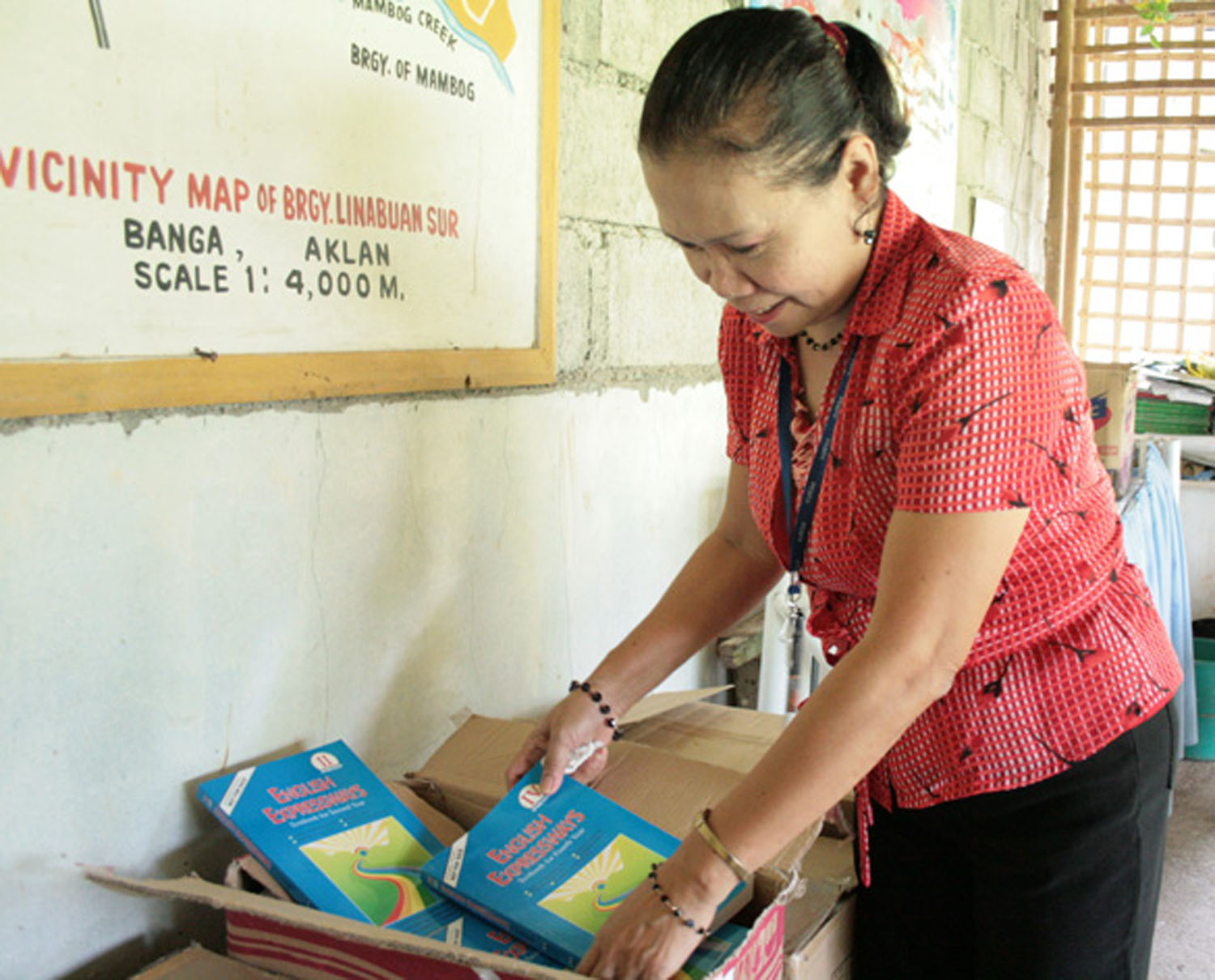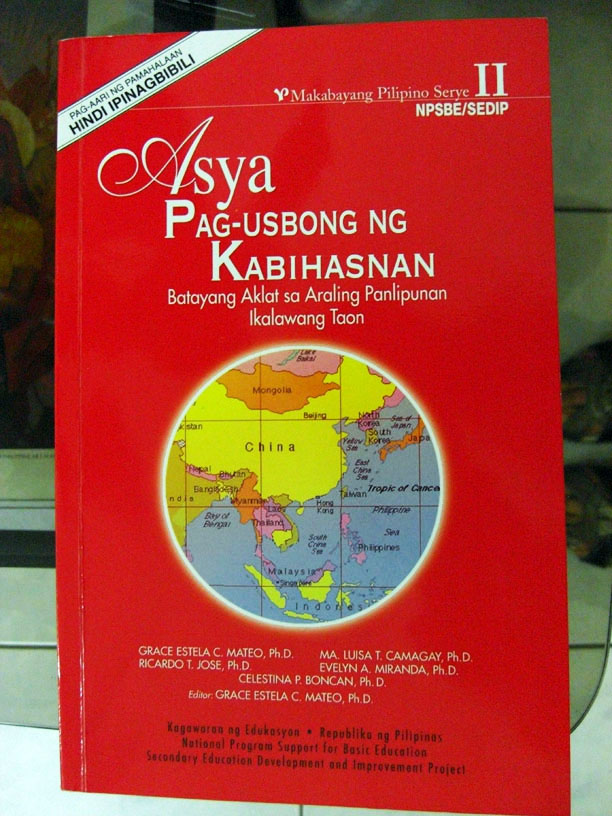By YVONNE CHUA and LUZ RIMBAN
WHEN public high school sophomores get the new Social Studies textbook next week, they will be holding in their hands what could be a source of a diplomatic irritant:The book mentions Taiwan as a “country” separate from the People’s Republic of China, in violation of the one-China policy the Philippine government upholds.
The error apparently went unnoticed by its authors—17 professors from the University of the Philippines, some of them with Ph.Ds—and the Department of Education, a government entity supposedly conscious of the one-China policy.
But the error has already caused a stir.In late April, Chinese customs authorities seized one shipment of about 400,000 copies of the textbook, which were printed in China, and threatened to destroy them unless the error was corrected.
The book in question is the 492-page Araling Panlipunan II textbook Asya: Pag-usbong ng Kabihasnan (Asia: Birth of Civilization), produced by the Vibal Publishing House and printed by the Ningbo Binbin Stationery Company based in Ningbo in Zhejiang province, China.
Ironically, it is supposed to replace an earlier error-filled edition entitled Asya: Noon, Ngayon at sa Hinaharap also published by Vibal,a 316-page book containing 430 factual and grammatical mistakes that had been in use since 1997, and pulled out after the errors were detected in 2004.
Perennial problem
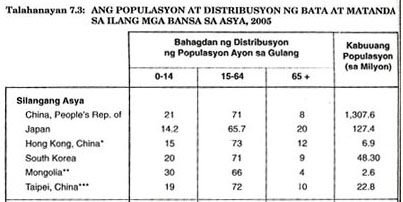 Social Studies textbooks are prone to errors because they involve “too many details, too many facts,” said Socorro Pilor, executive director of the DepEd’s Instructional Materials Council Secretariat (IMCS).
Social Studies textbooks are prone to errors because they involve “too many details, too many facts,” said Socorro Pilor, executive director of the DepEd’s Instructional Materials Council Secretariat (IMCS).
Besides, the DepEd placed “a high degree of confidence” in the authors who belong to the UP Manila’s Department of Social Sciences and UP Diliman’s History Department. Since the textbook also passed the scrutiny of the UP Asian Center, the IMCS expected Asya: Pag-usbong ng Kabihasnan to be error-free.
The DepEd’s textbook procurement program employs a complex mechanism that includes a four-level evaluation process involving master teachers, subject area experts, curriculum specialists, language experts, and representatives from universities and professional associations from both public and private sectors.Additional mechanisms have been instituted, and academics from the best schools such as UP and the Ateneo, and the National Historical Institute consulted.
On the distribution side, civil society organizations and parent-teacher groups are involved to make sure the books reach the schools and students on time.
Errors in public school textbooks have been a bane of the educational system.But holding people and groups accountable is something the DepEd has been hard put to do. In many instances, authors, publishing houses and printers have escaped responsibility for such problems.
The Philippine government adopted the one-China policy in 1975 when it established diplomatic relations with Beijing and severed ties with Taipei.Taiwan only maintains an economic and cultural affairs office in Manila.
Chinese officials are particularly sensitive to deviations from the one-China policy.In fact, even if the textbook Asya: Pag-usbong ng Kabihasnan is written in Filipino, Chinese customs authorities spotted the errors.
Last April 25, DepEd Undersecretary Teodoro Sangil sent a certification to Chinese authorities absolving Ningbo Binbin of any responsibility in the two-China fiasco found in Asya: Pag-usbong ng Kabihasnan.
“Ningbo Binbin has no control or participation whatsoever in the preparation of the textbook and teacher’s manual as its contractual obligation is limited to printing, binding, and delivery of the textbooks to the Department of Education in the Philippines,” wrote Sangil.
He further explained: “Asya: Pag-usbong ng Kabihasnan is a Social Studies textbook that is apolitical in nature (and) does not make any opinion on the political-sovereignty issue between the People’s Republic of China and Taiwan as the Philippines recognizes the one-China policy and that is the People’s Republic of China.”
Aside from this defense coming from Sangil, the authors had another argument for including Taiwan as a country.They said students would be left wondering about Taiwan if it were omitted from the list, since there is a sizable community of Filipino workers there.
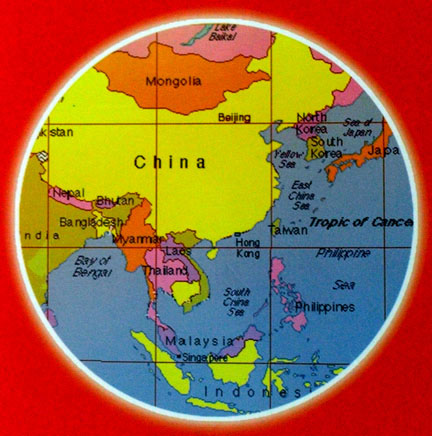 Last Saturday, the shipment was released by Chinese customs officials after Ningbo Binbin plastered a sticker of the Great Wall and Asian temples to correct the book’s original cover: a map identifying Taiwan as a country in East Asia.
Last Saturday, the shipment was released by Chinese customs officials after Ningbo Binbin plastered a sticker of the Great Wall and Asian temples to correct the book’s original cover: a map identifying Taiwan as a country in East Asia.
Inside, though, the errors remain. They are found on pages 90, 92, 94 and 99, which are lists of countries in Asia, their corresponding land areas, capitals, population and per capita incomes.
The covers of only one-third of the 1.4 million copies of this textbook and accompanying teacher’s manual worth close to P150 million have been corrected.
Two big shipments, with uncorrected covers, had arrived earlier and are being distributed to high schools in the 26 SRA (social reform agenda) provinces, the poorest and most underserved in the country.
So far, Pilor said, there is no order to correct the errors, including the cover, of the first two shipments.
Taking the fall
This isn’t the first time the DepEd is taking the fall for erroneous textbooks.Last year, the IMCS published a booklet of corrections on 150 errors found in seven new titles used in Grades 1 to 5 of Social Studies or HeKaSi (Heograpiya, Kasaysayan at Sibika).
The mistakes were detected by Antonio Calipjo Go, director of the Marian School, who had also spotted the blunders in Asya: Noon, Ngayon at Sa Hinaharap in 2004. The books were in Filipino and errors were grammatical as well as factual.
The suppliers of the HeKaSi 1 to 5 textbooks were Vibal, Watana Phanit, Daewoo International Corp. The DepEd shouldered the cost of printing the 70,000 copies of the corrections booklet sent to public school teachers all over the country.
Ningbo Binbin’s contract for Asya: Pag-usbong ng Kabihasnan is a supply and delivery contract. The company chose from a set of titles, paid royalties to Vibal Publishing, and took responsibility for the contents of the book. But rather than make the company accountable for the mistake, DepEd officials absolved it of blame for the two-China slip.
Asya: Pag-usbong ng Kabihasnan and two other Social Studies textbooks are in fact two years late and the bidding fraught with controversy. The bidding started in 2005, when the DepEd sought suppliers for HeKaSi 1 to 6 and Araling Panlipunan I to IV. The contracts were funded from loans from the World Bank’s National Program Support for Basic Education and the Asian Development Bank’s Secondary Education Development and Improvement Project.
All bidders for HeKaSi 6 and Araling Panlipunan I to IV, however, failed the content evaluation on the first try. On the second try, five suppliers took part in the bidding that started in December 2006: Ningbo Binbin of China, Alkem Co. of Singapore, and local publishers Anvil Publishing, Rex Bookstore and JTW Consortium which is part of Vibal.
The bids were opened on Dec. 27, and a decision was supposed to have been arrived at in April 2007.But a complaint lodged by Alkem hinting of manipulation by content evaluators forced the DepEd to hold the awarding of the contracts.
Alkem, which submitted the lowest bid for all the titles, questioned the failing mark it got for the design of its HeKaSi 6 teacher’s manual. The company submitted the same book in the 2005 bidding and passed the design evaluation.
Last October, the DepEd eventually awarded Alkem the P64.7 million HeKaSi 6 constract after the evaluators discovered a miscomputation when they were recalled to review the manual.
Bribery allegations
Also, shortly after the bids were opened, a series of text messages posted in the DepEd internal website and sent to several DepEd officials alleged that the IMCS, which coordinates the content evaluation, and its external evaluators had been bribed.
Screen shots of the text messages circulating as part of a white paper within the DepEd show a certain IMCS official demanding and accepting payoffs at various stages of the four-level evaluation process.The IMCS official purportedly asked for P30,000 per title to pass the evaluation and P300,000 per title to ensure that the bidder would clinch the contract. The bribe was referred to as “anda,” which is street lingo for grease money.
The official involved denied ever meeting with suppliers. But she admitted showing up at a restaurant in Pasig City sometime in December 2006 on the invitation of a former DepEd employee now working for one of the textbook suppliers.
She said she thought she was being set up for a blind date.The date turned out to be one of the bidders who offered her money to make sure the titles would pass. The IMCS official said she was “shocked and refused outright.”
In a memo dated June 13, 2007, Pilor asked the DepEd legal division to investigate the text messages but she has received no formal response.
The issue has reached the civil society organization G-Watch (Government Watch) of the Ateneo School of Government, which monitors government procurements. G-Watch said it will ask the DepEd legal department for an update on the bribery reports.
Civil society organizations have been helping the DepEd, but their participation is limited to the distribution of textbooks.
Redempto Parafina of the Ateneo School of Government, which runs G-Watch, has suggested letting CSOs have a hand in the evaluation of textbook content. G-Watch also suggests a mechanism where the DepEd could blacklist evaluators who approve error-filled textbooks and suppliers of these titles.
In the meantime, NGOs helping the DepEd distribute erroneous textbooks are faced with a dilemma.Parafina said: “Are we helping spread around the poison that are bad textbooks?”
